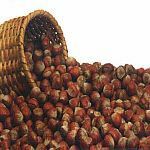Following the IMF/World Bank structural adjustment programme in 2007, and a drought brought about by global warming, the harvest yields of many products were lower. As a result, prices rose for consumers.
In 2008, the food crisis is still making itself felt. In addition, the economic crisis which originated in the USA and is now affecting the whole world, has also affected agriculture. This year, too, farmers in southeastern Anatolia have faced a severe drought.
Lower-than-average harvests
According to data from the Turkish Statistical Institute (TÜİK), many products yielded below-average harvests when compared with previous years. The harvest of red lentils dropped by 80 percent, of barley, soya beans and green lentils by 40 percent, of cotton and olives by 25 percent, of haricot beans by 20 percent, and of wheat, sunflower seeds and chickpeas by around 10 percent.
Mismanagement
Because Turkey has such geographical and climatic variety, it is suitable for a great variety of agricultural products. However, as a result of mismanagement and a limit on exports, farmers have become disillusioned with the sector. Also, valuable foreign currency was spent on imports.
Abandoned land
In the last five years, more than one million hectares of arable land have been abandoned, and around two million farmers have given up farming. The climate is still the greatest determining factor in agriculture; when droughts decrease production, nothing is done.
Foreign trade deficit rising
While the value of agricultural exports was 3 billion 724 million dollars in 2007, imports amounted to 4 billion 640 million dollars; this means a foreign trade deficit of 916 million dollars.
TÜİK published foreign trade data for 2008 at the end of January. According to the institute, there was a 5.4 increase in agricultural exports from 2007, thus amounting to 3 billion 928 million dollars. However, at the same time, imports rose by 37.7 percent, amounting to 6 billion 392 million dollars.
Thus, the foreign trade deficit in agricultural products has risen by 169 percent from the previous year, now amounting to 2 billion 464 million dollars. This is a “record” in the 85-year history of the Turkish Republic.
Agricultural Foreign Trade According to Year*
Year | Export | Import | Balance |
1996 | 2.153 | 2.166 | -13 |
1997 | 2.354 | 2.417 | -63 |
1998 | 2.357 | 2.125 | 232 |
1999 | 2.058 | 1.649 | 409 |
2000 | 1.659 | 2.123 | -464 |
2001 | 1.976 | 1.409 | 567 |
2002 | 1.754 | 1.703 | 51 |
2003 | 2.121 | 2.535 | -414 |
2004 | 2.542 | 2.757 | -215 |
2005 | 3.329 | 2.801 | 528 |
2006 | 3.481 | 2.902 | 579 |
2007 | 3.725 | 4.641 | -916 |
2008 | 3.928 | 6.392 | -2.464 |
*Million dollars, based on the International Standard Industrial Classification (ISIC, 3rd Rev.)
According to TÜİK, the greatest rise in imports was in grains, animal fat and plant oils, fertilisers, oily seeds and fruit. In 2007, grains to the value of 973 million dollars were imported, compared to 2 billion 137 million dollars in 2008, an increase of 119.6 percent. Fat and oil imports rose from 796 million dollars to 1 billion 658 million dollars, and fertiliser imports from 997 million dollars to 1 billion 482 million dollars.Imports According to Product (Million dollars)
Products | 2007 | 2008 | Increase (%) |
Grains | 973 | 2.137 | 119,6 |
Oily seeds and fruits | 1.020 | 1.465 | 43,6 |
Animal fats and plant oils | 796 | 1.658 | 108,3 |
Food industry left-overs and waste | 548 | 773 | 41,0 |
Tobacco and tobacco products | 302 | 392 | 29,6 |
Fertilisers | 997 | 1.482 | 48,6 |
Turkey must increase its investments in irrigation; it must move from surface irrigation to trickle irrigation and production models that use less water. In order to increase the efficiency and quality of agriculture, farmers need to be supported with input and technology. Environmentally-friendly production methods must be encouraged. (NO/TK/AG)





